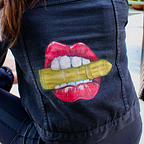My New Headshots
When I got my first professional headshots taken, the photographer asked me to stop smiling. He said that if anything I should be tweaking the corner of my mouth up in a smirk to highlight my lips. He said that toothy smile was “too sweet” on me and that I should aim to be more sultry, more seductive. “Don’t be nice. That’s not you. Seduce the camera…yes, that’s much more you!” I was fourteen years old.
At fourteen I was barely in highschool. I had just gotten rid of my braces and hadn’t even grown out of my training bra. This photographer was not some creepy rando looking to get off, he was a professional photographer who specialized in headshots. He was just trying to give direction that he thought would help me become successful. He knows how important headshots are in our industry and he knows how casting directors make decisions based on their initial glance of your picture.
High quality, up-to-date headshots are essential for an actor’s success. Casting agents can immediately tell if we have amature headshots. If they don’t convey a clear type, we won’t even be called into the casting room, but if they aren’t accurate to what the directors see on camera we never get called back. Photographers have to find the perfect balance where the actors are authentic, while also being marketable, attractive, and type specific. Achieving that combination was exactly what my first headshot photographer was trying to do for me.
Usually actors bring multiple looks into shoots so that we can portray multiple personas in our shots. The photographer asks about our type and tries to capture the essence of that character in the photos. Professional makeup artists spend hours perfecting our look to prominently convey stereotypical traits, and the photographer will work to emphasize them even further.
I have never liked this, especially when I was young and unfamiliar with the harsh realities of the industry. But I had grown to accept it and even be comfortable with it. Now that I’ve been researching the social and societal effects of typecasting, however, my opinions have begun to shift. Though my research has led me to believe that these systemic biases can’t be changed by actors alone, it doesn’t mean we have to be complicit.
I am getting new headshots on Friday. It’s about time; though they are essential to actors they are very expensive so I haven’t taken new headshots since high school. I was putting them off financially, but now I’m glad that I waited until this semester was over to take them. When I consulted with the photographer last week, I was able to have a conversation with her that I wouldn’t have been able to before. Rather than discuss my image, we discussed type as its own entity. I was honest with her about how my type has aided me in the past, but how its dominance in this industry has held so many back. I don’t want to benefit from something that is tearing opportunity from others, so I asked her to make these headshots as honest as possible. To be pragmatic and plain when taking the photos instead of pushing an angle. This is a very small step, but it’s a step in the right direction that I wouldn’t have been brave enough to take without understanding how influential and harmful typecasting has become. Though my headshots cannot spark a revolution, it’s something that I as the individual can do to make my future casting agents see beyond type. On Friday we are going to take photos that are Elizabeth, and nothing else. Not the bitch, not the slut, just Elizabeth.
